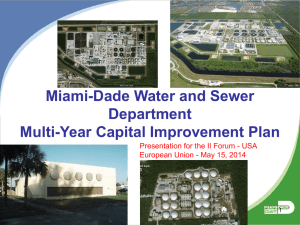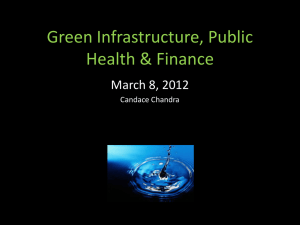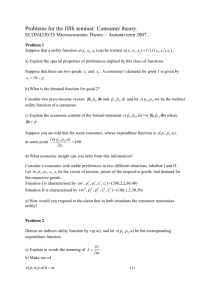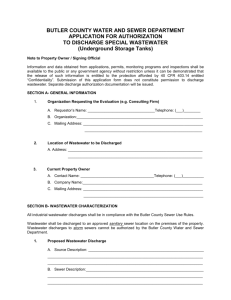IBNET Input Data Definitions
advertisement
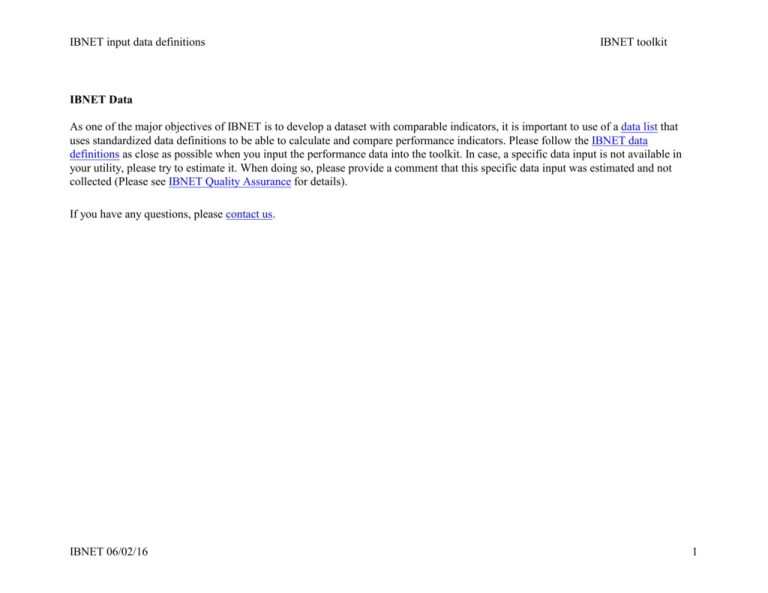
IBNET input data definitions IBNET toolkit IBNET Data As one of the major objectives of IBNET is to develop a dataset with comparable indicators, it is important to use of a data list that uses standardized data definitions to be able to calculate and compare performance indicators. Please follow the IBNET data definitions as close as possible when you input the performance data into the toolkit. In case, a specific data input is not available in your utility, please try to estimate it. When doing so, please provide a comment that this specific data input was estimated and not collected (Please see IBNET Quality Assurance for details). If you have any questions, please contact us. IBNET 06/02/16 1 IBNET input data definitions IBNET toolkit Data definitions Most data items are required as either a numerator or a denominator for one or more of the cost and performance indicators contained. Those that are not used for this purpose provide additional data that will be helpful in making comparisons between utilities. Some are ‘context information’ such as the range of services provided, or the nature of the area served. Others indicate how the utility carries out certain activities; planning, managing staff, sources of finance and customer relations. Before entering data, make sure that you have decided which indicators you wish to use, and therefore which data you need to enter. Please enter data for as many years as possible. Please note that all annual data should refer to fiscal years, for consistency with financial data. Data categories: Utility Information General Information Service Area Staff Water Service Sewerage Service Financial Information Tariff Information Customer Relations IBNET 06/02/16 2 IBNET input data definitions Ref IBNET toolkit Data Item Utility Information 1a Utility name 2a 2b 2c Country 1 Region 1 City 1 2d 3 Node 1 Extent of private sector involvement 3a Type of service provider 1 Comment Full name of utility. Please provide: Long name – up to 50 characters Short name – up to 20 characters State country in which utility located State region within country State city or town on which utility services are centered State node in which utility services are located A – none; B – service contract(s); C – management contract(s); D1 – affermage; D2 – lease contract(s); E – concession contract(s); F – build, (own,) operate & transfer contract(s); G – fully private asset ownership and operation (Choose up to 3) A. Local or National Government Water Department - Not ring fenced; (ie finances for water/wastewater function are not reported separately from other government activities) B. Local or National Government Water Department - Ring fenced; (ie finances for water/wastewater function are reported separately from other government activities) Unit Text Text Text Text Text Text Text For Information Only IBNET 06/02/16 3 IBNET input data definitions Ref IBNET toolkit Data Item Comment Unit C. Statutory body D. Local or National Government wholly owned provider operating under commercial law E. Jointly (Government and Private) owned provider operating under commercial law F. Privately owned provider operating under commercial law G. Not for profit provider operating under commercial law 32a 32b Type of services provided: Provides water service? Provides sewerage service? Provides other services? Nature of service area P1 What best describes the utility’s planning process? R1 Who has general oversight of the utility’s services and prices? Contact Information 1b Contact Name, Address, Tel. #, Fax #, e-mail IBNET 06/02/16 Text Yes/No Yes/No Yes/No 1 = urban, 2 = rural, 3 = urban and rural A = setting budgets for the next year, B = a multi-year plan that identifies targets and resources for change and improvement, C = other (please enter description) A = local, regional or national government department, B = independent board of stakeholders, C = independent service and price regulator, D = other (please enter description) Full contact details to allow communication with the node manager and peer utilities 1,2,3 Text Text Text 4 IBNET input data definitions General Information 5 GNI per capita (Atlas) 5a GNI per capita (PPP) 6 Exchange Rate 6a PPP Conversion Factor 9 Month in which fiscal year starts IBNET 06/02/16 IBNET toolkit Annual GNI per capita (Atlas method) for country for the year to which the data apply. (Source: World Bank GNI & exchange rate.xls file provided with this Toolkit) Annual GNI per capita (PPP method) for country for the year to which the data apply. (Source: World Bank GNI & exchange rate.xls file provided with this Toolkit) Annual average exchange rate to the US dollar for the year to which the data apply. (Source: World Bank GNI & exchange rate.xls file provided with this Toolkit). Converts the official exchange rate to a purchasing power equivalence (Source: World Bank GNI & exchange rate.xls file provided with this Toolkit). 1 = January, 2 = February, 3 = March, 4 = April, 5 = May, 6 = June, 7 = July, 8 = August, 9 = September, 10 = October, 11 = November, 12 = December US $ US $ Ratio Ratio 1 to 12 5 IBNET input data definitions Service Area 30 Total population in area of responsibility - water supply 30a Total population in area of responsibility wastewater 34 Number of Towns served with Water 1 35 Number of Towns served with Sewerage 1 IBNET 06/02/16 IBNET toolkit Total population under notional responsibility of the utility for water supply, irrespective of whether they receive service Total population under notional responsibility of the utility for sewerage, irrespective of whether they receive service Total number of towns under responsibility of the utility irrespective of their service coverage. Total number of towns under responsibility of the utility irrespective of their service coverage. ‘000 inhabitants ‘000 inhabitants # # 6 IBNET input data definitions Staff 36 Total Number of Staff 36a Total Number of Staff – Water 36b Total Number of Staff – Wastewater HR1 HR2 HR3 HR4 HR5 The management of your utility undertakes the following: Has a skills and training strategy for all staff? Has an annual appraisal and target setting system for managers? Has an annual appraisal and target setting system for all staff? Has a reward and recognition programme for all staff? Has the ability to recruit and dismiss staff (within an agreed plan)? IBNET 06/02/16 IBNET toolkit Total number of staff working at the utility on water and wastewater services. Report in terms of Full Time Equivalent staff numbers (FTEs). Total number of staff working at the utility on water services Report in terms of Full Time Equivalent staff Total number of staff working at the utility on wastewater services separately. Report in terms of Full Time Equivalent staff numbers (FTEs). # FTE # FTE # FTE Text Yes/No Yes/No Yes/No Yes/No Yes/No 7 IBNET input data definitions Water service 40 Population served 40a Population served – direct supply & shared taps 40b Population served – public water points 41 Number of water connections 53 54 Number of water connections with an operating meter Length of water distribution network 55 Volume of water produced Water Service (2) 58 Volume of water consumed metered 59 Volume of water sold IBNET 06/02/16 IBNET toolkit Population under responsibility of the utility with access to water through house connections, yard taps and public water points (either with direct service connection or within 200m of a standpost). Any population outside the utility’s area of responsibility who are served (e.g. people who come from outside to the Utility’s water points) should be excluded. Population under responsibility of the utility with access to water through house connections and shared yard taps (where 2 or more houses share a private yard with a tap). Population under responsibility of the utility with access to water through public water points. Number of active water connections at year-end. All active connections should be counted – residential, non-residential etc - but inactive connections to vacant buildings should be excluded. Total number of water connections with operating meter at year end Total length of the distribution network (excluding transmission lines and service pipes) Total volume of water produced for the service area, i.e. leaving treatment works operated by the Utility and purchased treated water, if any. ‘000 inhabitants Total volume of water billed that is metered, irrespective of whether the bill is paid or not. Total volume of water billed (metered and unmetered) irrespective of whether the bill is paid or Million m3/year ‘000 inhabitants ‘000 ‘000 Km Million m3/year Million m3/year 8 IBNET input data definitions 59a Total volume of water sold to residential customers 59a1 Volume of water sold to residential customers through direct supplies (defined as house connections and shared yard taps) IBNET toolkit not. Clearly any unmetered volume must be estimated from other information about the water users. Total volume of water billed to residential customers, split into direct supplies and public water points. The split is the same as for 40 above. Million m3/year 59a2 Volume of water sold to residential customers through public water points 59b Volume of water sold to industrial and commercial customers 59c Total volume of water billed to institutions and others 59d Total volume of water sold treated in bulk Water Service (3) 60 Number of Pipe Breaks 61 Duration of supply 61a Number of customers receiving an intermittent supply Required number of tests of treated water for residual chlorine 63 IBNET 06/02/16 Total volume of water billed, split between three types of non-residential customer. Million m3/year Total number of water pipe breaks in the distribution network during the year. Failures that require repair of mains, connections, valves and fittings that are the Utility’s responsibility, are included. Repairs from active leakage control are excluded. Average hours of service /day. This indicator measures intermittent supply systems; interruptions due to unplanned failures or rehabilitation work should be excluded. Percentage of residential customers who do not normally receive a 24 hours per day supply. The number of samples of potable water that are required by law/regulation to be taken from the distribution system to be tested for residual chlorine #/year Hrs/day % #/year 9 IBNET input data definitions 64 Number of tests of treated water for residual chlorine carried out 65 Number of tests of treated water for residual chlorine that passed the relevant standard IBNET 06/02/16 IBNET toolkit The number of samples of potable water actually taken from the distribution system , that have been tested for residual chlorine The number of samples of potable water taken from the distribution system, that have been tested for residual chlorine and comply with the standard #/year #/year 10 IBNET input data definitions Sewerage service (1) 70 Population served – sewer connection 71 Number of sewer connections 74 Length of the sewer system(s) 79 Number of blockages in the sewer system(s) IBNET toolkit Population under responsibility of the utility with sewerage services through house connections. Total number of sewer connections (residential and non-residential) at year end in thousands. Total length of the sewerage network (excluding service connections). Total number of sewer blockages in the network during the year. ‘000 inhabitants ‘000 km #/year Sewerage Service (2) 81a Total volume of wastewater collected Million m3/year 81b Million m3/year 81c 81d 81e Volume of wastewater collected through the sewer system or by tanker. Where it cannot be measured, estimates should be made based on water use & infiltration from the ground (which should be included). Total volume of wastewater collected – residential Volume of wastewater collected from residential connections through the sewer system or by tanker Where it cannot be measured, estimates should be made based on water use & infiltration from the ground (which should be included). Total volume of wastewater collected – industrial & Volume of wastewater collected from industrial and commercial commercial connections through the sewer system or by tanker Where it cannot be measured, estimates should be made based on water use & infiltration from the ground (which should be included). Volume of wastewater that is treated to primary Primary treatment is settlement that removes a level significant proportion of solid matter. Screens are not primary treatment. Volume of wastewater that is treated to at least Secondary treatment is generally biological, and secondary level removes oxygen demand amongst other IBNET 06/02/16 Million m3/year Million m3/year Million m3/year 11 IBNET input data definitions IBNET toolkit contaminants. IBNET 06/02/16 12 IBNET input data definitions IBNET toolkit Financial Information (1) Much of the information included will be available in the utility’s annual financial statements. The source of information should be specified. If possible please comment on how the different items were being determined. All information is annual and should be provided in local currency (LC). 90 Total W & WW operating (billed) revenues Total billing of water and wastewater services, connection fees, well abstraction fees, reconnection fees and other operational revenues including subsidies, but excluding all taxes 90a Total billings to residential customers Total billed amounts to residential customers during year – to include fixed and volumetric charges only. 90b Total billings to industrial & commercial customers Total billed amounts to industrial and commercial customers during year – to include fixed and volumetric charges only 90c Total W operating revenues Split of (90) total operating revenues into water and 90d Total WW operating revenues wastewater services. See the box at the top for guidance on making the split. 90e Total W billings to residential customers Water supply services. Include fixed and volumetric 90f Total W billings to industrial &commercial charges only. customers 90g Total W billings to institutions and other customers Total W billings for bulk treated supplies 90h 90I Total WW billings to residential customers Wastewater services. Include fixed and volumetric Total WW billings to industrial & commercial charges only. 90j customers Financial Information (2) 91 Total W&WW (cash) income Income actually received for water and wastewater services 94 Total W&WW operational expenses Total operational expenses (W&S) excluding depreciation and financing charges (interest and capital repayments). IBNET 06/02/16 LC/year LC/year LC/year LC/year LC/year LC/year LC/year LC/year 13 IBNET input data definitions 94a 94b Total W operational expenses Total WW operational expenses 96 Labor costs 97 99 Electrical energy costs Contracted out services costs Financial Information (3) 112 Total Gross Fixed Assets 112a 114 Total Gross Fixed Assets Including Work in Progress – Water Total Gross Fixed Assets Including Work in Progress – Wastewater Total Debt Service 120 Year end accounts receivable 112b Financial Information (4) What are the main sources of finance for investment? F1 Grants or government transfers to the utility? F2 Borrowing from international financial agencies (multi or bi laterals)? F3 Government owned banks? F4 Commercial banks or bond holders? IBNET 06/02/16 IBNET toolkit Split of (94) total operating expenses into water and wastewater services. See the box at the top for guidance on making the split. All costs within (94) that are labour related (salaries, wages, pensions, other benefits, etc.). All electrical energy costs within (94) Costs of all services within Item (94) provided by private firms. Gross Book Value of fixed assets at year end, including work in progress Split of (112) Total Gross Fixed Assets into water & wastewater LC/year LC/year LC/year LC LC Total debt service costs (Including interest and LC/year repayment of capital) Total of all accounts receivable at year end including LC water billings, and all other outstanding invoices. Text Yes/No Yes/No Yes/No Yes/No 14 IBNET input data definitions Tariff Information 146 Fixed charge per month for W&WW services for residential customers 146a 146b 147 148 C1 C2 C3 C4 Fixed charge per month for W services for residential customers Fixed charge per month for WW services residential customers Connection charges – Water Connection charges – Sewerage Does the utility offer more than one level of service for household or shared water supplies (excluding free standpipes)? Does the utility offer more than one level of sanitation or sewerage service/ technology for households (excluding free public toilets)? Does the utility offer a flexible/ amortized repayment option to spread the costs of connection to the water and/or sanitation network? What would be the monthly water bill for a household consuming 6m3 of water per month through a household or shared yard tap (but excluding the use of standposts)? IBNET 06/02/16 IBNET toolkit The fixed component of the bill (if any) for the provision of water and wastewater services. Indicate no fixed charge with a Zero Split of (146) Fixed Charge per Month into water and wastewater LC/month Lump sum cost for residential water connection Lump sum cost for residential sewerage connection Yes/No LC LC Text Yes/No Text Yes/No Text Monthly water bill for a household consuming 6m3 of water per month through a household or shared yard tap LC LC/month 15 IBNET input data definitions Customer Relations 37 Means by which customers can make a recorded complaint 37a Number of complaints – total C5.1 C5.2 C5.3 C5.4 How does the utility find out the views of its customers? Letters, telephone calls etc from customers Responding to customer complaints Questionnaire survey Other IBNET 06/02/16 IBNET toolkit Tick any of: letter, telephone, in person, email, other Total number of customer complaints during the year. Depending on the Utility’s methods of recording complaints, they may have been made by letter, telephone, in person, or in other forms. Tick all boxes that apply. If ‘other’, please give details. #/year Text 16

